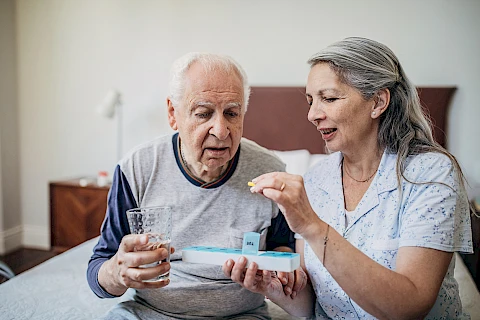
As we age, medication management becomes an increasingly significant aspect of everyday life. Managing multiple prescriptions can be challenging for seniors, requiring careful attention from both them and their caregivers, who assist with their daily routines.
As a caregiver, understanding how to efficiently and effectively manage medications is vital to ensuring the overall health and well-being of your loved ones. Today we'll unpack some practical strategies for caregivers like you. Your role is critical in guaranteeing medication adherence and monitoring potential side effects. Read on!
The Need for Accurate Documentation
Proper record-keeping forms the critical foundation of medication management. A comprehensive record of a senior's medication history is invaluable for caregivers and medical professionals involved in the senior's care. It's imperative to maintain a medication log with all the essential details, including:
- The prescriber's name and contact information
- The name of the medication
- Dosage
- Potential side-effects
This document should be reviewed, updated regularly, and brought to all medical or dental appointments.
Using Organizing Tools for Medication Management
High-tech tools simplify medication management tasks. The market offers various organizing tools, such as automatic pillboxes, medication reminders, and apps that can be customized to suit seniors' needs and capabilities. The selection of the tool depends on various factors, such as the senior's comfort with technology, the complexity of the medication schedule, and the senior's cognitive abilities.
Maintaining Communication With Healthcare Providers
Regular and transparent communication with healthcare providers is vital in senior care. Caregivers shouldn't shy away from asking questions about medication instructions or expressing concerns about potential drug interactions. Reporting any observed side effects or changes in the senior's health can alert the healthcare provider to possible issues that might require adjustments in the treatment plan. Open communication helps caregivers gain insights about medication management and keeps healthcare providers informed about seniors' health.
Ensuring Medication Adherence
Medication adherence can be challenging for seniors, especially those with complex medication schedules or cognitive impairments. Improving consistency may involve setting reminders, aligning medication times with daily activities to make it part of the routine, and involving the senior in the process. This not only helps in improving adherence but also imparts a sense of responsibility and control to seniors over their health.
Monitoring for Side Effects
The risk of side effects can increase with age as the body's ability to metabolize drugs changes. That's another reason why caregivers need to be vigilant in monitoring side effects and recognizing the signs of adverse drug reactions. Understanding these signs can be vital in preventing serious health complications.
We're Here to Help
Does your senior loved one need assistance with medication management? If they live in the Denver, Stevens, Ephrata, Akron, or Mount Joy areas, Senior Helpers Lancaster County is ready to help. Our caregivers are trained in a wide range of senior-specific care, from meal planning and preparation to organizing medications.
Contact us today for more information about our services and how we can help your loved one live independently in their own homes and give you the respite and peace of mind you deserve.